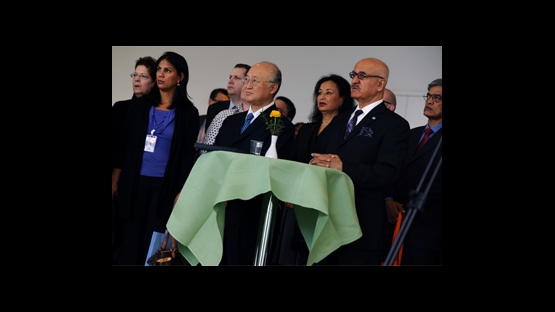On 2 February 2011, the IAEA commemorated World Cancer Day with a special event held at its headquarters in Vienna. The event highlighted important achievements in the past year in global efforts to fight cancer in developing countries, and featured activities of the IAEA's Programme of Action for Cancer Therapy (PACT) and several of its key partners.
With almost two thirds of all cancer deaths occurring in the developing world, the IAEA supports countries by helping increase patients' access to improved radiotherapy services and by strengthening medical training.
Speaking at the event, Director General Yukiya Amano highlighted the importance of fighting cancer in developing countries, stressing important achievements in the past year.
An On-going Cancer Crisis
"A shortage of around 5 000 radiotherapy machines in low- and middle income countries means that hundreds of thousands of patients are denied diagnosis and treatment that could save their lives," the IAEA Director General pointed out.
"PACT, as well as various other departments at the IAEA, have been working hard to try to make radiotherapy services available in all countries," he said. For nearly a decade, PACT has pursued partnerships to help low- and middle income countries mobilize resources for cancer prevention and to provide equitable access to all cancer services for their population.
The Department of Technical Cooperation provides financial and technical assistance to Members States all around the world. Utilizing its expertise, the IAEA Division of Human Health provides vital resources to health professionals in fields such as radiotherapy and nuclear medicine.
"The Agency is supporting over 130 projects in cancer diagnosis, management and treatment. Oncology and radiotherapy centres are being established in countries such as Afghanistan, Eritrea and Mozambique, while national capacity in radiotherapy is being strengthened in - for example - Albania and Kenya," Director General Amano said.
Important Partnerships
Representing an important partner in fighting cancer in developing countries, Suleiman J. Al-Herbish, Director General of the OPEC Fund for International Development (OFID), also spoke at the event. In his statement, Mr. Al-Herbish announced a $450 000 donation from OFID to PACT to support cancer control projects in Vietnam. To date, OFID has contributed about US$ 1.5 million to five IAEA projects dedicated to fighting cancer.
Mr. Al-Herbish praised the IAEA's achievements in combatting cancer and OFID's pride in being an ally in this effort.
"In PACT, the Agency has made measurable progress in expanding the availability of radiotherapy services and improving cancer prevention and control throughout the developing world," he said.
Julie Torode, Deputy Chief Executive Officer of the Union for International Cancer Control (UICC), another IAEA partner in fighting cancer, also spoke at the event. She presented the UICC programmes and stressed the importance of civil society involvement.
"UICC is grateful to the IAEA for recognizing the civil society voice in all its activities and we are proud to be a partner of the PACT Programme of Action for Cancer Therapy," Ms. Torode said.
Together It Is Possible
The statements made at the IAEA commemorative event for World Cancer Day shared a common thread. All of the speakers stressed the importance of joining efforts in the fight against the cancer epidemic in developing countries.
The adoption of the Political Declaration on Non-Communicable Diseases by the UN General Assembly in September 2011 further underscores the importance of uniting in partnership to reduce cancer's burden on society.
"The slogan of World Cancer Day this year is Together It Is Possible," Director General Amano concluded. "This reflects the importance of international collaboration in the fight against the global cancer epidemic which, tragically, continues to claim the lives of over 10 million people per year."


